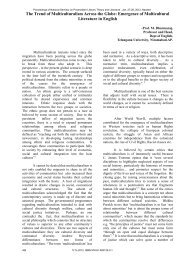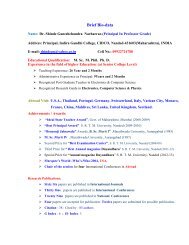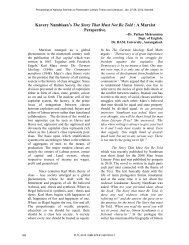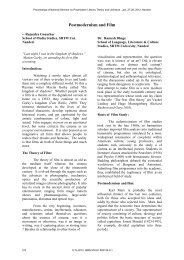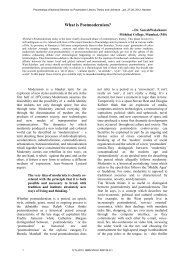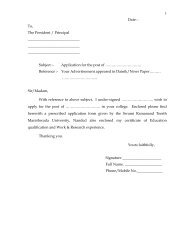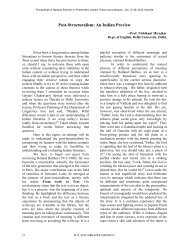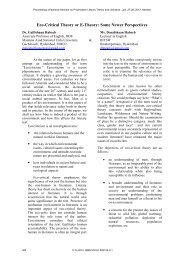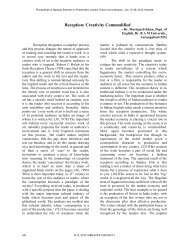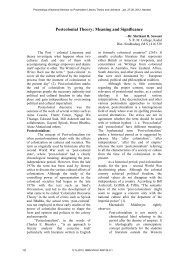Proceedings of National Seminar on Postmodern Literary <strong>Theory</strong> and Literature , Jan. 27-28, 2012, NandedBut, the striking feature of the work is definitelythe conceptualization of reason as an important,paramount element in the formation of a worldorder beyond the patriarchal one. In hersubsequent works, Carter considers reason as thefirm ground of her feminist cause. That is anReferences:1 <strong>An</strong>gela Carter. “Notes from the Front Line,”in Michelene Wandor [ed.], On Gender andWriting. London: Pandora Press, 1983,pp.69-77. Here, Carter feels that “it isenormously important for women to writefiction as women-it is part of the slow processof decolonizing our language and our basichabits of thought” [p.75].2 <strong>An</strong>gela Carter. Heroes and Villains. NewYork: Penguin, 1993, p.18. All subsequentreferences in the chapter from this edition ofthe book are given in the body as HV.3 Elaine Jordan. “The Dangerous Edge’, inSage, Lorna[ed]”, <strong>An</strong>gela Carter. GreatBritain: Virago Press, 1994, pp.197-8.4 Elaine Jordan. “The Dangerous Edge”, inSage, Lorna [ed], Flesh and the Mirror:Essays on the Art of <strong>An</strong>gela Carter. London:Virago, 1994, p.198.5 Frankie Rickford. “No More SleepingBeauties and Frozen Boys,” in Eileen Phillips[ed.], The Left and the Erotic. London:Laurence and Wishart, 1983, p.142.6 John Haffenden. “Interview with <strong>An</strong>gelaCarter”, in Novelists in Interview. New York:Methuen, 1985, pp.76-96.7 Lorna Sage. “The Savage Sideshow: AProfile of <strong>An</strong>gela Carter”, The New Review, 4,1977, p.56.8 Lorna Sage. <strong>An</strong>gela Carter, Writers and theirwork series, p.19.9 Lorna Sage. <strong>An</strong>gela Carter. Plymouth:Northcote House Publishers, 1994, p.15.10 Lorna Sage. <strong>An</strong>gela, Carter, p.18.11 Michael Foucault. “What wasEnlightenment?” trans. Catherine Porter, inPaul Rainbow[ed.], The Foucault Reader.Harmondsworth: Penguin, 1984, p.42.12 Paulina Palmer. ‘From “CodedMannequin” to Bird Woman: <strong>An</strong>gela Carter’sMagic Flight,’ in Sue Roe [ed], WomenReading Women’s Writing. Brighton:Harvester Press, 1987, p.188.important feature of the conceptual frame ofreference used by her. In her works, Carter aswe observe, quite frequently both explicitly andimplicitly, complicates, deepens and extends herunderstanding of reason.305 PLTL-2012: ISBN 978-81-920120-0-1
Proceedings of National Seminar on Postmodern Literary <strong>Theory</strong> and Literature , Jan. 27-28, 2012, NandedFeminism in Khaled Hosseni and Chetan Bhagat—A Comparison--Fahmeeda Patla & Sowmya Raj B MGovt. First Grade College, Banglore.At first glance a comparison betweenthe Afghan-born American novelist Hosseni’s AThousand Splendid Suns and the Indian born IITgraduate Chetan Bhagat’s, Two States the Storyof My Marriage seem incomparable. On closerreading we find both the male writers treatmentof women characters to be “lead protagonists”.The two novels are set in different times- Russiaoccupied Kabul and contemporary India,different settings—fanatic Islam and secularIndia, and different focus— love for themotherland, yet migration to safer countries andthe autobiographical story of a love marriageagainst all odds.The lead characters in Hosseni’s novel--Nana, Mariam and Laila are representative ofwomen in Kabul in particular and Afghanistan ingeneral. The women protagonists’ in Bhagat’snovel—<strong>An</strong>anya, Kavita, Radha, arerepresentative of the contemporary women ofIndia. The travails of all these women aredifferent, but their responses to them aresurprisingly similar. This paper is divided intothree parts—the first part discusses womenprotagonists’ in Hosseni’s novel—A ThousandSplendid Suns, the second part discusses womenprotagonists’ in Bhagat’s novel—Two States theStory of My Marriage and the third part isconclusion.PART ONE-- A THOUSAND SPLENDIDSUNSNana, representative of the first generationwoman in the Hosseni’s novel is the wrongedwoman. She is a servant in Jalil’s house anddoes not have the sanction of society for her“illegal relationship” with Jalil and thereforechooses to suffer a life of ignominy andrebelliously eschews society. “Women of thefirst generation are hyper sensitive individualsinept to cope with the environment around themand the tussle and the mismatch drag them tothe inevitable catastrophe---entry into the blindand the no-return path of neurosis”, opines V.Ramesh in his essay “Indian Women –ThePrinciples and the Principals-A <strong>Feminist</strong>icElucidation” i . Nana decides to live outside thecity, in a Kolaba –small house made of stonewalls, with virtually no contact with the rest ofthe world with her young daughter Mariam .Nana is extremely attached to her daughter,possessive and unwilling to let her be educatedor send her out of sight. Maraim grows olderand wants to see the city, where her father is afamous man and is the owner of the cinema.Despite warnings of not finding love andacceptance in her father’s family and pleadingsof “I’m all you have in this world, Mariam, andwhen I’m gone you’ll have nothing. You’ll havenothing. You are nothing.” Mariam goes out tothe city only to return shamefaced, as her fatherrefuses to see her, and findsher mother dead.Nana, Mariam’s mother has committed suicide,the neurotic that she is. Mariam is all of 15years old at this juncture and married off toRasheed, a 45year old businessman from Kabul,a city, 650 kilometers away, from Herat, by herfather and his other wives only to wash theirhands off their responsibility.This most unsuitable suitor for youngMariam is a common solution for many girls inPatriarchal societies. It can be seen in ThomasHardy’s novel “The Mayor of theCasterbridge”, in the famous scene of thedrunken Michael Henchard selling his wife andinfant daughter for five guineas at a country fair.Patriarchal societies do not readily sell their306 PLTL-2012: ISBN 978-81-920120-0-1



